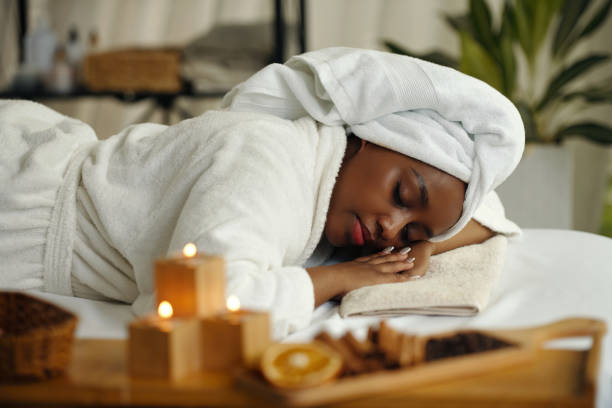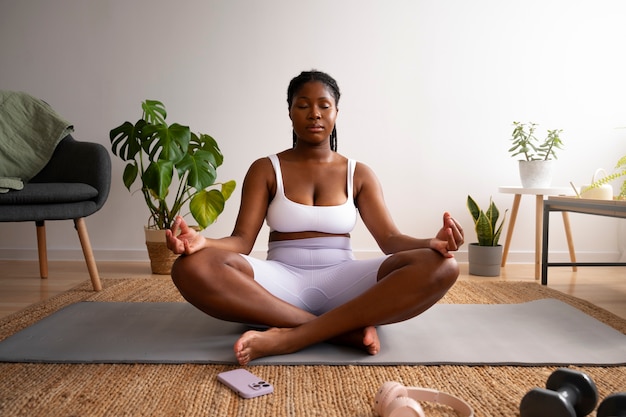Health
The Link Between Stress and Libido – What You Should Know

Stress has become a common part of our daily lives, but too much stress can affect our physical and mental health. One of its physical effects is a reduced sex drive. Libido is an individual’s sexual drive and is influenced by several physical and emotional factors.
A healthy libido is key to maintaining a sexual relationship. This is why managing stress is important. Here are some effects of stress on sex drive and effective ways to improve it.
Effects of Stress on Libido
Your libido can be affected by stress in the following ways :

Hormonal changes
Stress releases hormones which help the body cope with emergencies. However, too much exposure to these hormones reduces the body’s estrogen and testosterone levels, which is why partners experience low sexual desire.
Impact on Mental Health
Your mental health plays a key role in your sexual well-being. Chronic stress can cause depression and anxiety, which can affect your libido. During prolonged depression, sexual desire often reduces significantly, sex will be the last thing on your mind. This is because Emotional disorders can create a disconnect between the body and mind, reducing sexual desire.
Physical Effects
Your body is also affected by stress. Fatigue, headaches, migraines, and muscle tension are common stress-related symptoms that could make it difficult to become intimate with your partner. Additionally, excessive stress can cause sleep disorders, leading to reduced interest in sex.
So what can you do to manage this?
Read Also : How To Boost Your Immune System Naturally
Effective Ways to Manage Stress and Improve Your Libido
If stress is negatively affecting your libido, here are excellent tips to improve your sexual well-being:

Relax More
Meditation, and yoga are effective relaxation when it comes to libido improvement. When stressed, find a quiet place to connect with yourself and calm your nerves. Relaxation has a positive impact on mental health and can help boost libido.
Sleep
Poor sleep has been associated with higher levels of depression. Sleep deprivation negatively affects your sexual health. Maintain a consistent sleep schedule and rest. Aim for around eight hours of sleep each night to support.

Exercise
Regular physical activity is an excellent choice for those who want to increase their sexual drive. By engaging in regular exercise, you release endorphins- hormones that combat stress. Exercise also improves blood circulation and boosts energy levels.
Bottom Line
While stress cannot be completely avoided, you should not let it affect your health. Stress can harm your mental and physical well-being, making intimacy with your partner difficult. By practicing strategies such as yoga and regular physical activity, you can improve your libido.
Health
Workout Routines That Support Bones Health

Strong bones depend on more than just calcium or supplements. Research shows that bones respond to physical stress: when muscles and weight-bearing activities challenge the skeleton, bone tissue becomes denser and stronger. To protect skeletal health over the long term, exercise should combine weight-bearing activity, resistance training, and balance work. Together, these exercises address the main risk factors for fractures: low bone density, weak muscles, and poor coordination.

Photo Credit – Google
Weight-bearing activity doesn’t need to be extreme to be effective. Regular brisk walking around neighbourhoods or local parks strengthens hips, legs, and spine, while climbing stairs or light jogging improves lower-body density. Dance classes, including Afrobeat or traditional Nigerian dances, provide varied movement patterns that engage muscles and improve coordination. Starting with 15–20 minutes per session, three to five days a week, and gradually increasing intensity or duration can deliver measurable benefits.

Photo Credit – Google
Resistance training plays a key role in maintaining strong bones. Gradually increasing weight or resistance helps muscles and bones adapt. Exercises such as squats and deadlifts target the hips, thighs, and spine, while lunges and step-ups build strength in the lower body and promote functional movement. Push-ups, pull-ups, and shoulder presses strengthen the upper body and spine. Two to three sessions per week covering all major muscle groups are sufficient. Free weights, resistance bands, or bodyweight exercises can all be effective depending on what equipment is available.

Photo Credit – Google
Balance is equally important because falls are a leading cause of fractures. Single-leg stands and heel-to-toe walking improve stability and coordination, while yoga, Tai Chi, or mobility exercises enhance control and complement other workouts. Integrating balance with strength and weight-bearing exercises provides a complete approach to bone health.
Common mistakes include relying solely on low-impact cardio such as swimming or cycling, which has little effect on bone density, and attempting high-impact exercises without preparation, which can increase injury risk. Effective routines should be planned, progressive, and performed consistently to build resilience safely.

Photo Credit – Google
A sample weekly schedule could include strength-focused exercises on Monday, such as squats or step-ups, deadlifts or hip-hinge movements, and push-ups or shoulder presses. Wednesday could focus on weight-bearing activity and balance through brisk walks, single-leg and heel-to-toe drills, and light dynamic movements. Friday can target functional strength with lunges or carries using household objects, core stability exercises, and stretching or yoga. This cycle can be repeated weekly, increasing load or complexity gradually.
Strong bones require intentional, evidence-based exercise. By combining weight-bearing activity, resistance training, and balance work, Nigerians can maintain bone density, reduce fracture risk, and improve overall skeletal resilience. Starting at your current fitness level, increasing load progressively, and including balance exercises will help protect bones for the long term.
Health
Disordered Eating Vs. Eating Disorder: Experts Explain The Differences And When To Seek Help

Disordered eating and clinical eating disorders are not interchangeable. Disordered eating refers to irregular or emotionally influenced habits around food: chronic dieting, skipping meals, rigid food rules, occasional binge episodes or persistent preoccupation with calories, weight or body shape. These habits may shift, but when repeated over time they often point to growing vulnerability.
Clinical eating disorders, by contrast, are diagnosed mental-health or medical conditions marked by persistent, patterned behaviours that impair physical health, mental wellbeing or daily functioning. Conditions such as anorexia nervosa, bulimia nervosa, binge‑eating disorder and other specified feeding or eating disorders fall into this category.

Image: Google
Evidence from Nigerian research confirms that disordered eating attitudes and risk for eating disorders are present among young adults and adolescents. In a study of more than 1,050 undergraduates from two higher‑education institutions in Lagos, roughly 16 percent scored positive on the EAT‑26 screening tool for disordered eating attitudes.
At a university in Ile‑Ife, a survey of female undergraduates found that 17.1 percent were classified as at high risk for eating disorders, based on the same screening instrument.
A more recent analysis among female undergraduates in Lagos found a lower prevalence of disordered eating (about 5 percent). Still, the study flagged a strong association between body-image dissatisfaction, body‑mass index (BMI) and disordered eating attitudes.
Adolescents are not exempt: a survey of 13 to 19-year-olds in Ibadan used screening tools to assess disordered eating behaviours and feeding/eating disorders. Results showed that 28.2 percent exhibited disordered eating behaviours, and a significant portion also met screening criteria for feeding/eating disorders.

Image credit: Google
Clinical, clearly diagnosed cases have also been documented. There’s a recorded instance of a 20-year-old undergraduate at a Nigerian university diagnosed with anorexia nervosa showing that what may start as dieting or food anxiety can escalate into serious health and psychiatric risk.
Because disordered eating and eating disorders exist within the Nigerian context, distinguishing between them matters. Persistent preoccupation with food, weight or body shape; regular dieting, bingeing or purging; emotional distress tied to eating; and disruption of everyday life are all red flags. When those signs persist, seeking professional support whether nutritional counselling, psychological therapy or medical care becomes essential.
Health
The Exercise That Keeps You Younger

If you’ve ever met someone in their fifties who moves like they’re still in their twenties, it’s likely they’ve discovered the simple habit that keeps the body from giving in to age: regular movement.

While fitness trends keep changing, one form of exercise has stayed constant in its benefits: strength training. It’s not about building bulky muscles or chasing a perfect body. It’s about keeping your bones strong, your joints stable, and your metabolism from slowing down. After the age of 30, the body naturally begins to lose muscle each year. That’s why everyday tasks, like climbing stairs or carrying groceries, start to feel heavier. Strength training helps reverse that.

Research supports this claim. People who lift weights or engage in resistance exercises have lower risks of diabetes, heart disease, and cognitive decline. But beyond the science, it’s about how it makes you feel. Nigerians juggling work, traffic, and family life know how draining each day can be. Even short sessions of body-weight squats, lunges, or push-ups a few times a week can recharge you better than most expensive wellness fads.

It also boosts your mood. Physical activity releases chemicals that help clear mental fog and lift your energy. It’s your body’s way of proving it still has strength to give.
You don’t need a gym to start. A mat, a pair of dumbbells, or even two water bottles will do. The goal is to stay consistent, to keep your body active enough to stay responsive.
Each push, lift, or stretch is a reminder that staying young isn’t about denying age; it’s about moving through it with strength.
-

 Sex & Relashionships5 months ago
Sex & Relashionships5 months agoSigns You Have Abandonment Issue and How to Heal
-

 Movies5 months ago
Movies5 months agoMovie Review: Task Official Trailer
-

 Top Xclusiv5 months ago
Top Xclusiv5 months agoItalian Designer Giorgio Armani Dies at 91
-

 Celebrity Style4 months ago
Celebrity Style4 months agoEniola Badmus Creates a Deck-of-Cards Visual in Photoshoot
-

 Music5 months ago
Music5 months agoAyra Starr – Hot Body Video Review
-

 Celebrity Style3 months ago
Celebrity Style3 months agoMercy Aigbe Keeps it Sharp in Ivory Dress
-

 Celebrity Style4 months ago
Celebrity Style4 months agoTwo Ways to Wear a Suit, According to Liquorose
-

 Bags4 months ago
Bags4 months agoFrom Kano to Chelsea: Winston Leather Marks a New Chapter in Luxury
-

 Fashion5 months ago
Fashion5 months agoMimi Yina Brings Street Style to Life in Denim
-

 Models4 months ago
Models4 months ago5 of Damilola Bolarinde Best Looks

























